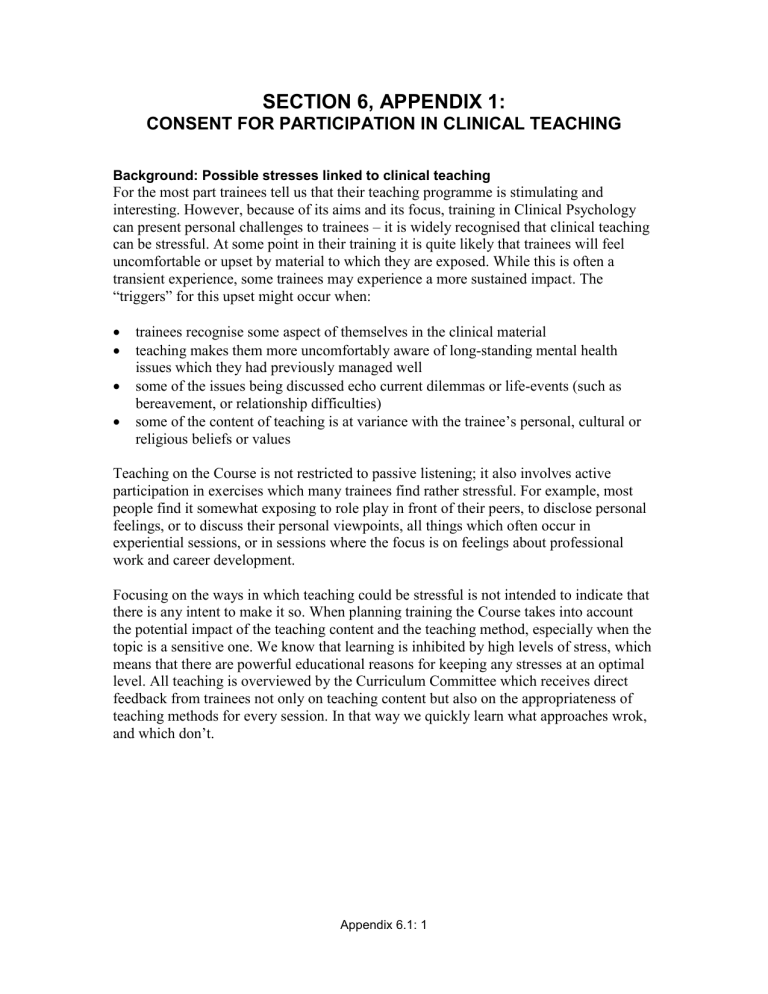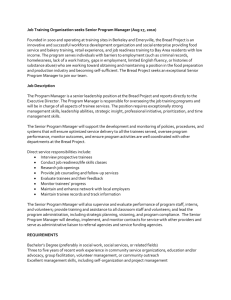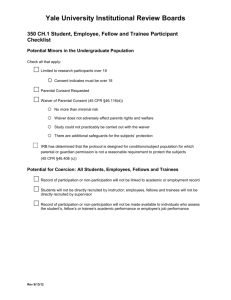SECTION 6, APPENDIX 1: CONSENT FOR PARTICIPATION IN CLINICAL TEACHING

SECTION 6, APPENDIX 1:
CONSENT FOR PARTICIPATION IN CLINICAL TEACHING
Background: Possible stresses linked to clinical teaching
For the most part trainees tell us that their teaching programme is stimulating and interesting. However, because of its aims and its focus, training in Clinical Psychology can present personal challenges to trainees – it is widely recognised that clinical teaching can be stressful. At some point in their training it is quite likely that trainees will feel uncomfortable or upset by material to which they are exposed. While this is often a transient experience, some trainees may experience a more sustained impact. The
“triggers” for this upset might occur when:
trainees recognise some aspect of themselves in the clinical material
teaching makes them more uncomfortably aware of long-standing mental health issues which they had previously managed well
some of the issues being discussed echo current dilemmas or life-events (such as bereavement, or relationship difficulties)
some of the content of teaching is at variance with the trainee’s personal, cultural or religious beliefs or values
Teaching on the Course is not restricted to passive listening; it also involves active participation in exercises which many trainees find rather stressful. For example, most people find it somewhat exposing to role play in front of their peers, to disclose personal feelings, or to discuss their personal viewpoints, all things which often occur in experiential sessions, or in sessions where the focus is on feelings about professional work and career development.
Focusing on the ways in which teaching could be stressful is not intended to indicate that there is any intent to make it so. When planning training the Course takes into account the potential impact of the teaching content and the teaching method, especially when the topic is a sensitive one. We know that learning is inhibited by high levels of stress, which means that there are powerful educational reasons for keeping any stresses at an optimal level. All teaching is overviewed by the Curriculum Committee which receives direct feedback from trainees not only on teaching content but also on the appropriateness of teaching methods for every session. In that way we quickly learn what approaches wrok, and which don’t.
Appendix 6.1: 1
Support for trainees
Although we expect trainees to be appropriately robust in relation to the issues which training throws their way, we also expect them to be able to reflect on and to talk about their feelings – all of us need to recognise when seeking support from others is the most appropriate action. The Trainee Handbook contains clear information about sources of support. Although it can be very hard to draw the Course’s attention to difficulties, suffering in silence is not helpful, and not a good model for a professional career.
Consent to participation in clinical teaching
It is a requirement of the Health Professions Council that when students participate in clinical teaching they have given informed consent to this. For this consent to be meaningful it is important to set out the Course’s expectations, and the rights of trainees.
Course expectations in relation to clinical teaching
The Course expects that trainees will actively participate in all aspects of the academic programme, including:
Lectures
Experiential exercises which take place as part of lectures
Workshops on clinical topics
Seminars (including clinical seminars, academic seminars, reflective practice seminars and modality specific clinical seminars)
Role-play as part of the above activities (including taking the role of both therapist and client)
Where a trainee finds participation difficult they are entitled to withdraw, but the Course expects them to do this in an appropriately professional manner. If their level of personal distress is very high and results (for example) in prolonged withdrawal from specific areas of teaching, it is expected that the trainee take appropriate action. This would normally include discussion with their Course Tutor, who can arrange for them to be exempted from teaching activities, and who will also discuss the most suitable strategies for managing the situation.
In practical terms, trainees who find themselves distressed during a lecture or a workshop are entitled to leave, but should do so as quietly as possible, returning if they feel able to, and if possible discussing their absence with the lecturer or workshop leader. Trainees who feel that a workshop task is too personally demanding are entitled not to participate, but should do so in an appropriately negotiated manner, if possible discussing this with the workshop leader.
Disclosure of personal information
During academic teaching there should be no pressure on trainees to disclose personal information which they feel uncomfortable revealing and especially personal information which they do not see as relevant to the task of training. However, the nature of the
Appendix 6.1: 2
programme means that discussion of personal feelings in relation to professional development is often appropriate and necessary, and there is an expectation that trainees will be open to discussion of these feelings if these are relevant to their clinical work and professional development.
Confidentiality
Trainees who discuss their experience of stress arising from clinical teaching (or indeed any personal issue) with a member of staff are entitled to the usual assurance of confidentiality that applies in clinical contexts. This means that information that they disclose will not usually be discussed with third parties without their consent and/or knowledge. As in clinical contexts, a guarantee of confidentiality cannot be absolute, as might be the case if there were serious concerns about the welfare of the trainee. Any such breaches would be rare, and would usually be discussed with the trainee.
The HPC publish guidance relating to confidentiality on their website (the document is entitled ‘Confidentiality – Guidance for registrants’), and this expands on the principles set out in this paragraph.
Consenting to participate clinical teaching
At the end of this document is a formal consent form. Signing it means that trainees acknowledge and accept the expectations set out above. Because these make it clear that there may be circumstances where they might wish to withdraw from clinical teaching, it should be clear that while they are consenting to participate in teaching this consent is not absolute, and includes the right to withdraw if there are good grounds for doing so.
“Informed consent” means that trainees are not obliged to sign this form. If they have any queries about it they are free to discuss it and its implications with their Course Tutor.
Appendix 6.1: 3
Doctorate in Clinical Psychology
Consent to participation in clinical teaching
please indicate with a cross
I have read the background information provided by the Course which: a) acknowledges the potential stresses inherent in clinical teaching b) sets out the Course’s expectations of trainees in relation to their participation in clinical teaching
I am aware that I am not obliged to sign this form. please indicate with a cross please indicate with a cross
I am aware of the relevant sections of the Trainee Handbook which describe the sources of support offered by the course and by external agencies.
I consent to participate in the clinical teaching provided by the University College
London Doctorate in Clinical Psychology
Name of trainee:
Signature: Date:
Appendix 6.1: 4


